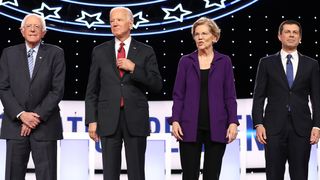For every Democrat who wants to know who their presidential candidate will be in 2020, you're going to have to wait a while longer.
The race is wide open. There is no presumptive frontrunner following today's debate in Ohio.
Joe Biden had the most to prove – and the most to lose. He only partially succeeded in consolidating his position as the likely nominee. In his discussion of President Trump and the attacks on himself and his son, Hunter, Biden was still on the defensive, unsure of his footing. And in the Democratic subconscious is the lurking thought of whether we are seeing Hillary Clinton 2016 redux, when she could not drive that stake through the heart of the Trump vampire.
On foreign policy, and discussion of Trump’s decisions on Turkey and Syria, Biden was absolutely authoritative; we saw a President Biden on the screen. Later in the debate, he scored personal points when he said that his long experience has conferred wisdom, and that he “knows exactly what needs to be done to get this country back on track”. He also reminded Senator Elizabeth Warren how hard he worked to get her financial reform bill through Congress during the GFC. It was reassuring indeed, but he did not nail it.
For the first time, Warren, who has had a brilliant run throughout 2019, was on the defensive, especially on healthcare and taxes. She does not wear attacks well. And it raises the question as to how she would fare against Trump. Yes, she is aggressive, intellectually rigorous and deep on policy, but how easily can Trump label her a socialist, and take her down? The issue of her divisiveness, and therefore her electability, remains.
While Bernie Sanders looked quite well after his heart attack, it is clear that his illness did not reach to his vocal cords. But it feels like he has capped out, that there is no further headroom for his support base to grow.
The clear standouts were Kamala Harris and Pete Buttigieg.
The clear standouts were Kamala Harris and Pete Buttigieg. Harris, whose mini-tutorial on impeachment as the debate began, and who said later on that “justice is on the ballot” in this election, again showed her fierce adherence to principles driven by her life and career experience. She insisted that abortion be in the forefront of this campaign, and absolutely protected. Buttigieg displayed (again) his supple and broad intellect, and balanced policy instincts informed by his roots in the industrial Midwest. Both cut through and connect when they have the chance to engage the audience.
Amy Klobuchar and Cory Booker emerge from this campaign with new respect and regard, and as even better senators. Beto O'Rourke was at his best on gun control, which has been core to his campaign since the massacre in El Paso in August. Billionaire Tom Steyer and entrepreneur Andrew Yang have strong voices – but zero prospects. Hawaiian Rep. Tulsi Gabbard will continue to represent her electorate in Hawaii.
So what happens from here? Democrats still want to be sure that the nominee they choose really is the one with the best prospects of defeating Trump. This is their highest priority.
Biden has got to get more aggressive – which he showed, at last, in his closing remarks. And Warren needs to expand her appeal.
But if Harris and Buttigieg can find a way to break through, their fuses can be lit. And this is where the early primaries are so important. Both Buttigieg and Harris have extensive campaign organisations in Iowa. If they really deliver caucus votes, they can ascend into the top tier.
The reality is that the top three finishers in each of Iowa, New Hampshire, Nevada and South Carolina will constitute the final contenders for the nomination. If you wanted to place a long bet: Buttigieg has a real opportunity to surprise in Iowa and become the Jimmy Carter of 2020. At least for a few days.






